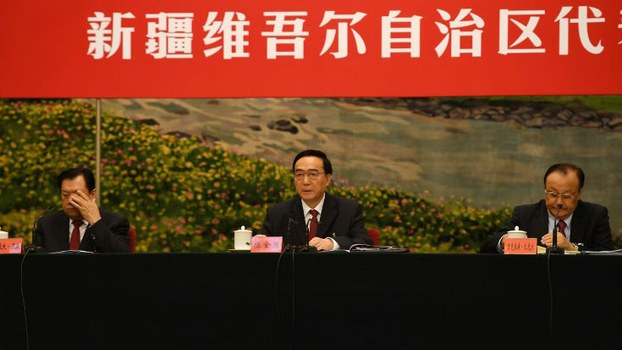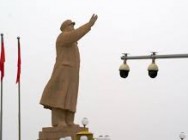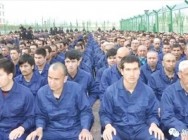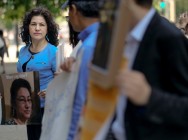Last Minute

- Conflict and Alliance: The US and China: A Centennial Dance: A Century of Relationship from 1900 to 2024
- CHINA RELATIONSEAST TURKESTAN PROBLEM AND TURKEY
- FRONTLINE China Undercover
- Elimination of “Uyghur Counter-Revolutionary Officials” in Academic Fields—Exact Quotes Translated from a Mandarin Audio File
- In Push for Trade Deal, Trump Administration Shelves Sanctions Over China’s Crackdown on Uighurs
- Dalai Lama’s 60th Anniversary Symposium: İlshat Hassan speech in English and Chinese
- Uyghur Detainees from Xinjiang ‘Placed in Nearly Every Prison’ in Shandong Province
- Shahrezad Ghayrat, Unrepresented Women
- Uighur Americans Speak Against China’s Internment Camps. Their Relatives Disappear.
- Rozinisa: The true story of the Uyghur girls in the prison

-

Conflict and Alliance: The US and China: A Centennial Dance: A Century of Relationship from 1900 to 2024
-

CHINA RELATIONSEAST TURKESTAN PROBLEM AND TURKEY
-

FRONTLINE China Undercover
-

Elimination of “Uyghur Counter-Revolutionary Officials” in Academic Fields—Exact Quotes Translated from a Mandarin Audio File
-

In Push for Trade Deal, Trump Administration Shelves Sanctions Over China’s Crackdown on Uighurs
-

Dalai Lama’s 60th Anniversary Symposium: İlshat Hassan speech in English and Chinese
Rights Groups Condemn China’s Detention of RFA Reporters’ Relatives
Human rights and press freedom watchdog groups condemned China’s detention of close relatives of four U.S.-based reporters for RFA’s Uyghur Service in apparent retaliation for their coverage of the Xinjiang region, as a fifth Uyghur reporter came forward on Thursday with an account of missing family members.
The Committee to Protect Journalists said it is “alarmed” by news that authorities in the northwestern China’s Xinjiang region have detained multiple relatives of U.S.-based RFA journalists Gulchehra Hoja, Shohret Hoshur, Mamatjan Juma, and Kurban Niyaz. More than two dozen relatives have been affected by the clampdown, RFA has learned.
“Punishing family members of journalists beyond the reach of the Chinese government is a cruel, if not barbaric, tactic,” said CPJ Asia Program Coordinator Steven Butler said in a statement.
“The Chinese government should immediately account for these people’s health, whereabouts, and legal status and set them free,” he said.
The New York-based CPJ was responding to a Washington Post report on Wednesday on the four Uyghur reporters, whose work has documented a brutal crackdown on the Turkic-language speaking Muslim minority since the installation of a hard-line Communist Party boss in the Xinjiang region in August, 2016.
Amnesty International, meanwhile, issued an urgent appeal for 20 relatives of Hoja, a 17-year veteran RFA reporter, who “have been detained and are at risk of torture” and were believed to have been targeted for her work for the U.S.-government-funded broadcaster based in Washington.
“Media reports from Radio Free Asia, Buzzfeed, the Globe and Mail, the Associated Press and others, as well as information gathered by Amnesty International, indicate that in the spring of 2017, authorities throughout the region began detaining Uighurs en masse, and started sending them to administrative detention facilities or sentencing them to long prison terms,” said Amnesty.
Hoja’s brother Kaisar Keyum was taken into custody by Chinese police in October 2017, while her parents are unreachable and suspected to be in custody.
Another brother of Hoja’s has been detained since September 2017 and her extended family – as many as 20 relatives – are feared detained and being held in undisclosed locations, she told RFA.
When her brother was detained, police told Hoja’s mother that her employment with RFA was the reason for his detention. The relatives may have been detained for communicating with her through a WeChat group, according to a cousin who she was able to contact, Hoja said.
‘Stop calling inside China’
Hoshur’s brothers Shawket Hoshur and Rexim Hoshur were jailed from August 2014 until they won release December 2015, in part due to pressure on China from the U.S. Congress.
However, the two brothers were detained again in September 2017 and are now being held in the Qorghos county re-education camp. Shohret’s younger brother Tudaxun Hoshur, who was sentenced in 2015, remains jailed.
Shohret told RFA he has heard from family members in Xinjiang who have told him they were contacted by Chinese authorities urging them to ask him to stop calling inside China.
RFA Uyghur Deputy Director Mamatjan Juma reported that his brothers Ahmetjan Juma and Abduqadir Juma were detained in May 2017.
While the whereabouts of Ahmetjan, who has a family and a toddler son, are unknown, Abduqadir was taken to Urumqi No. 1 Prison, a facility known for incarcerating political prisoners in inhumane conditions in Urumqi, the regional capital of Xinjiang.
Abduqadir suffers from heart and health issues that require medical care, and his sister was denied access to him in prison, Mamatjan Juma said.
“He needs immediate medical attention. I am extremely worried that his health condition will dramatically worsen without proper food and medication and, more importantly, the inhumane treatment he faces in Chinese prison,” he said.
Juma said his mother has suffered a heart attack and has been hospitalized four times in recent weeks. His father died in October 2017 and he learned of his father’s passing only 10 days later.
“I cannot send money to help because of Chinese government restriction on my family,” he said.
RFA Uyghur broadcaster Kurban Niyaz’s youngest brother, Hasanjan Niyaz, was arrested in May 2017 in Bugur county, and in July sentenced to six years in jail on charges of “holding ethnic hatred.”
Fifth RFA reporter affected
Niyaz’s other relatives in Xinjiang have been visited by police, who have questioned them about Niyaz and another U.S-based brother, he said.
Following reports by the Washington Post, the Associated Press and other international media outlets that brought attention the fate of the four reporters’ families, a fifth RFA journalist on Thursday revealed that three of his relatives and in-laws have been detained.
RFA broadcaster Eset Sulaiman said his elder brother, an educator in the Tianshan region, was picked up by authorities around October 2017 and sent to undergo forced study at a “Political Re-education Camp” in Qomul City (in Chinese, Hami).
His mother-in-law, Saadet Kichik, and father-in law, Memteli Sopi, both pensioners in their 70s, were also detained in October 2017 and sent to the same re-education camp.
“Because of my job at RFA and my wife’s position on the board of the Uyghur American Association, Chinese authorities have retaliated against and threatened us by detaining three relatives in the Uyghur Region,” said Sulaiman, who last saw his relatives in person in 2008.
“Because I cannot contact my family since the end of 2017, I did not hear about my mother’s death in real time,” he said.
“She passed away February 18, but I heard this news four days later through my relative in Sweden. I don’t know what happened to my other brothers and sisters,” added Sulaiman.
“We’re very concerned about the well-being and safety of our journalists’ family members, especially those in need of medical treatment,” said Rohit Mahajan, director of public affairs at RFA in Washington.
“We’re also particularly concerned about the use of detentions as a tactic by Chinese authorities to silence and intimidate independent media, as well as to inhibit RFA’s mission of bringing free press to closed societies.”
Amid what many analysts see as a worldwide slide toward more authoritarian rule, RFA journalists have been targeted by other illiberal Asian regimes, many of which are close allies of China.
Chen Quanguo’s draconian policies
RFA closed its operations in Cambodia in September amid a government crackdown on the media, and two former RFA Khmer Service reporters were taken into custody on Nov. 14. They formally charged with “illegally collecting information for a foreign source.”
Uon Chhin and Yeang Sothearin, who deny the charges, were denied bail from pre-trial detention and face a possible jail term of up to 15 years if convicted of the charges against them.
The RFA Uyghur journalists have produced detailed reports on how Xinjiang Communist Party Secretary Chen Quanguo, who took office in August 2016, has set up numerous detention facilities throughout Xinjiang and imposed harsh policies affecting the 10 million Uyghurs in China.
The camps are variously called “counter extremism centers,” “political study centers,” or “education and transformation centers” and are believed to hold tens of thousands of Uyghurs as well as ethnic Kazakhs and other Muslim minorities.
“People are often sent to these detention facilities if they are known religious practitioners, have relations with ‘foreign contacts,’ or have themselves been caught up in social stability campaigns or have relatives who were involved in the same,” said Amnesty International in its appeal for Hoja’s relatives.
“Authorities have detained people who receive phone calls from outside of China. Authorities have also tried to ensure that nobody uses encrypted messaging apps, and instead rely on domestic apps, which have no encryption or other privacy safeguards,” said Amnesty.
Asked about the detentions at a news conference in Beijing, Chinese Foreign Ministry spokesman Lu Kang said he had no information on the cases.
“I suggest you raise your question to the competent department,” he said Wednesday, adding: “We welcome all foreign media to do fair and objective reporting in China.”
RFA, which broadcasts in nine languages in six authoritarian Asian countries, “is the only Uyghur voice in the free world out of the control of the Chinese government,” said Dolkun Isa, president of World Uyghur Congress, an advocacy group in Washington.
“We know that Chinese government has illegally detained hundreds of thousands of innocent Uyghurs in concentration camps. But we had never imagined that Chinese government would go after the loved ones of Uyghur journalists working at RFA,” he added.
Despite China’s rising wealth and growing global clout, the Chinese media languishes near the bottom of most major international rankings of media freedom.
“China continues to be the world’s biggest prison for journalists … and continues to improve its arsenal of measures for persecuting journalists and bloggers,” Reporters Without Borders (RSF) said in its annual report for 2017.
The Paris-based RSF ranked China 176th in press freedom last year, above only Syria, Turkmenistan, North Korea and Eritrea.
Reported by RFA’s Uyghur and English Services.
https://www.rfa.org/english/news/uyghur/reporters-relatives-03012018164751.html
RELATED NEWS












